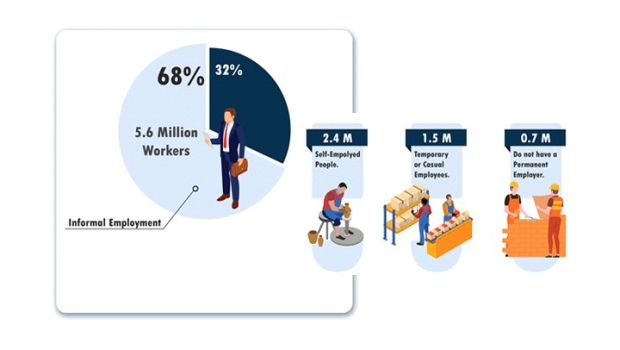COLOMBO – About 75% of Sri Lanka’s workforce or 1.5 million employees are facing a high risk of falling in to poverty, with 68% in informal employment amid the novel coronavirus crises, a survey done by a Colombo based think tank has found.
The Institute of Policy Studies (IPS) said 68% of the total employed population in Sri Lanka is in informal employment, employed under low wages or precarious jobs. “These jobs lack the basic protection that formal jobs provide, including social protection coverage and paid leave,” the research note said, adding, “Besides, these workers have no income replacement if they are unable to work in case of illness.
IPS said 75% of the jobs created in the private sector in 2006 – 2018 were temporary and casual, and that due to the pandemic, private sector employees with temporary jobs with limited job security and social protection are facing high risk of falling in to poverty in the future.
“Without appropriate policy measures, around 1.5 million unprotected temporary workers face a high risk of falling into poverty due to income and job losses,” IPS warned.
The IPS survey found that only 29% of the total workforce are covered by social protection which mainly includes public sector employees and the majority of private sector permanent employees.
“Although employees in temporary forms of employment are entitled to be enrolled for Employment Provident Fund (EPF) only 12% of temporary/casual workers are covered,” the research had found.
“Because the adherence to labour laws are not properly monitored in the informal sector, many informal sector workers are not enrolled in EPF. Furthermore, there is no established social security scheme for self-employed workers,” it noted.
The research said, the labour market policies in Sri Lanka provide employment security, but not labour market security.
Given that the Employees Trust Fund (ETF) provides some income support in the event of unemployment, the government can consider converting the ETF fund as a proper unemployment insurance scheme, it recommended.
“Going forward, social dialogue between employers, unions and government, and the ETF fund should be transformed into an unemployment insurance (UI) scheme for all categories of workers, based on a fair sharing of the cost between employers, workers and government” IPS said, adding that it was an important step to promote decent work and support transitions from the informal to the formal economy and job-rich recovery in Sri Lanka.
The proposal comes as the government plans to raise the retirement age to 60 and raising fears that private sector workers would not be able to draw the money by 55 years and the government would use it for deficit spending at low interest rates.
-economynext.com


